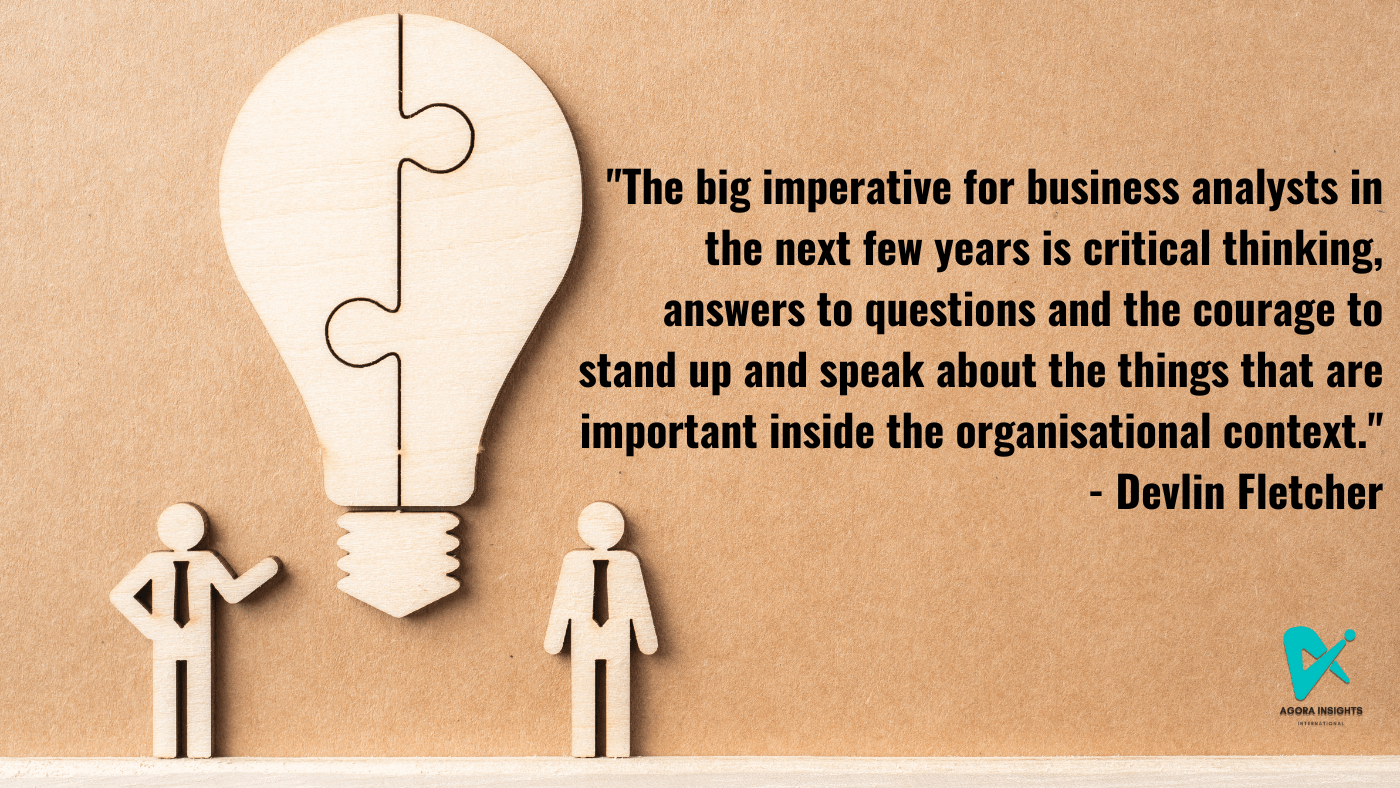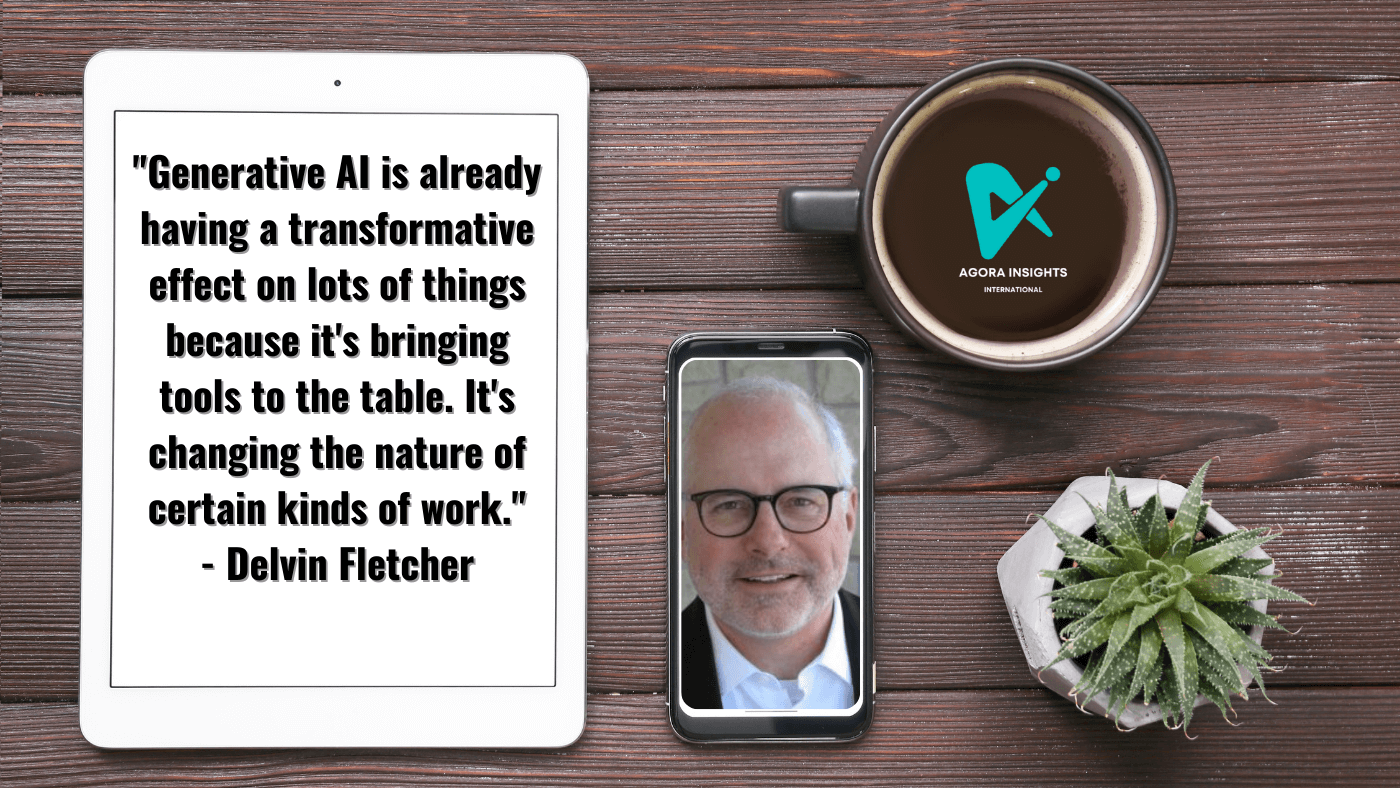Hosted by Deirdre Caren in Agora Insights' Blueprints for Success - Business Analysis and AI
I recently had the pleasure of engaging in a rich and enlightening conversation with Delvin Fletcher, the President and CEO of the International Institute of Business Analysis IIBA.
In our discussion, we covered a range of topics relevant to business analysis and business architecture, touching on the evolving nature of the professions, the impact of AI, and the experiences of working remotely. Let's get started...
Background
Delvin Fletcher is a leader with strong and focused experience in heading organizations. This includes his current position as CEO and President of the IIBA, and his previous role as Chief Information Officer with the Chartered Professional Accountants of Ontario (CPA Ontario).
With his background in membership associations, information systems, public accounting, government and not-for profit organizations, built on a solid foundation in industrial engineering from the University of Toronto, Delvin has an impressive history in management consulting, process improvement, and IT. His career spans various high-growth companies where he has been instrumental in driving foundational change and digital transformation.
Delvin joined the IIBA just before the pandemic, bringing his extensive experience to bear during a period of significant global transition. His leadership at IIBA has seen the organization grow and adapt in the face of new challenges and opportunities. He is a speaker at the IIBA's BBC 2024 Conference.

3 Key Topics
1. The Relationship Between Business Analysis and AI
The evolution of business analysis, particularly in the context of AI, was a central theme of our discussion. Delvin emphasized the enduring importance of critical thinking, despite the rapid technological advancements that are reshaping the field. As AI tools become more prevalent, the ability to question, validate, and adapt becomes increasingly valuable.
Delvin's insights prompted a reflection on the role of business analysts as agents of change, who must be courageous in challenging assumptions and navigating the complexities of data-driven decision-making. We recognized that while AI can process and analyze data at unprecedented speeds, the human element – the nuanced interpretation and strategic thinking that business analysts bring to the table – remains irreplaceable.
Therefore, the ability to ask the right questions and use critical thinking to analyze AI-generated insights is becoming ever more crucial.
"Business Analysts need to be able to adapt, apply, sense and respond to the changing AI is bringing."
- Devlin Fletcher
2. Remote Work and Its Impact on Teams
The shift to remote work has been one of the most significant changes in recent times. This new dynamic has had profound effects on how teams operate and collaborate. Delvin shared his observations on the transition, highlighting that while remote work offers flexibility, it also poses challenges in maintaining team cohesion and productivity.
We discussed the importance of communication and the need for clear strategies to ensure that remote teams stay connected. The role of business analysts in facilitating these strategies is critical. By helping to define processes and tools that support effective remote collaboration, business analysts can play a key role in navigating the complexities of a dispersed workforce.
The IIBA, a 100% remote based team, had a degree of preparedness that many organizations lacked. Yet, they were not immuned to the trials that come with such a sudden global transition. Delvin highlighted the importance of empathy and communication, acknowledging the unique challenges each team member faced in adapting to this new normal. The conversation underscored the necessity of balancing productivity with well-being, a lesson that extends beyond the confines of remote work and into the broader scope of team dynamics.
"Good leaders are fundamentally looking for somebody to tell them the truth."
- Devlin Fletcher
3. The Synergy Between Business Analysis and Business Architecture
Delvin sees a natural affinity between business analysis and business architecture. While their scopes may differ, with Business Architecture taking a broader organizational design perspective, the skill sets required for both are strikingly similar. Delvin's view is that good business analysis can encompass aspects of Business Architecture, especially when it involves connecting the dots within an organization to achieve a coherent strategy.
We talked about the importance of understanding the broader organizational context and how strategic alignment can drive success. Business analysts and architects alike need to be systems thinkers, capable of seeing the big picture while also appreciating the finer details. It's this blend of strategic vision and tactical expertise that enables professionals in both fields to drive meaningful change within their organizations.
"For me, business analysts are like investigative journalists.
I expect them to unravel the story, to dig deeper." - Deirdre Caren
10 Learning Points
Here are ten key takeaways from our discussion:
- Critical thinking remains an essential skill for business analysts, especially as AI tools provide rapid insights.
- Curiosity and the ability to listen actively are vital in uncovering deeper insights within business analysis.
- Business analysts should strive to be a non-anxious presence, providing calm and reasoned input in decision-making.
- Understanding the basics of finance can provide valuable context and credibility for business analysts.
- It's important to have the courage to speak up and challenge assumptions or data when necessary.
- Good leaders value honesty and the ability to discern the truth, which business analysts should embody.
- Business analysts must be adaptable, able to pivot and blend methodologies as required.
- Data lineage and reference ability are increasingly important in validating the insights generated by AI.
- Business analysts should learn from their leaders, observing and adopting effective leadership traits.
- The professions of business analysis and business architecture share many skills, and practitioners should focus on the broader picture and strategic alignment.
Close
In closing, my conversation with Delvin Fletcher was a reminder of the dynamic nature of the Business Analysis profession and the exciting challenges that lie ahead. As AI continues to shape our work, it's clear that the foundational skills of business analysis, combined with a willingness to adapt and grow, will be crucial for success. For those looking to connect with Delvin, he can be reached best through the IIBA, and you can catch his insights on AI at the upcoming BBC conference. Thank you all for joining us, and I hope you found this discussion as insightful as I did.
Feel free to share in our Blueprints for Success Podcast or comment with any questions!

To get weekly videos and interviews from leaders around the world subscribe to our Blueprints for Success Newsletter on LinkedIn
Don't forget: if you are considering further studies in Business Analysis or Business Architecture, take a look at
Agora Insights Ltd
Have you seen our new AI solution for organizations? Ready for a demo? Click on Aidon.ai
Contact Deirdre Caren on LinkedIn https://www.linkedin.com/in/deirdrecaren/
From Delvin
I'm privileged to serve with a global not-for-profit that is the foundation for the vibrant business analysis profession. We partner with dedicated member communities in more than 100 countries, business partners, academic institutions, training providers, a network of chapters in more than 40 countries, and a passionate team of almost 2,000 volunteers.
IIBA is the global standard for business analysis information, resources, certifications, and acts as a continuous support system to members and communities, helping them champion organizational excellence and deliver better business outcomes.
I am excited about the future of the business analysis profession. Join us on our journey by visiting iiba.org to see how we can support your career path and organizational objectives.
IIBA Shape the Practice of Business Analysis to Achieve Better Enterprise Outcomes




Post a Comment